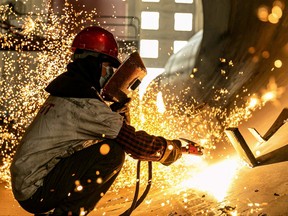风萧萧_Frank
以文会友弗兰克·斯特罗纳克:制造业的萎缩让加拿大变得虚弱
https://nationalpost.com/opinion/the-gutting-of-our-manufacturing-industries-has-made-canada-weak
当我们不再能够生产新型战斗机或潜艇的高科技部件时,谁来为我们生产?俄罗斯?还是中国?
作者:弗兰克·斯特罗纳克 2024年5月28日
中国制造业 2021年,一名工人在中国南通的一家工厂生产出口工程设备。图片来源:STR/AFP
文章内容
“中国制造”:这是你在全国各地商店出售的许多产品上都能看到的标签。偶尔,你会看到其他国家制造的产品。但你很少看到加拿大制造的产品。
当我们还是制造业强国时,我们的生活水平令世界羡慕。如今,随着制造业的萎缩,我们的生活水平也在下降。
而中国,则是一个快速崛起的经济和军事超级大国。中国人过去常常从其他国家购买战斗机和航空母舰。现在,他们大多自主制造。
早在20世纪90年代和21世纪初,经济学家们就曾盛传,像加拿大和美国这样的发达经济体不再需要制造产品。他们认为,这项工作可以外包到成本更低的国家。
相反,他们声称我们应该专注于通过软件和知识经济创造财富——那些不需要实物投入或钢铁、塑料等材料的产品和服务。
据专家称,我们最终都会成为高技能的知识工作者,能够开发软件和处理数据,而且我们的境况会好得多,不再需要亲手从地下挖掘矿物,也不再需要在工厂的流水线上辛苦劳作。
我从未认同这种想法——这不仅仅是因为我在所谓的“旧经济”制造业工作过。对我来说,一个放弃制造业的国家注定会落后和衰落。
凯利·麦克帕兰:我拒绝从中国购买商品的一年
凯利·麦克帕兰:贾斯汀·特鲁多幼稚的电动汽车计划将钥匙拱手让给了中国
多年来,我们越来越少地专注于创造真正的财富,而是越来越多地参与转移和重新分配我们创造的、正在减少的财富的过程。结果,我们慢慢地放弃了农场和工厂,如今我们购买的许多产品和消费的食品都依赖于进口。
放弃制造业的后果是严重而深远的。制造能力的下降将导致国家技术基础和技术诀窍的衰退。
制造业及其供应基地共同开发了种类繁多的技术和产品——从精密的电子产品到新型复合金属和塑料,应有尽有。例如,在我担任麦格纳国际董事长期间,我们与苹果公司合作开发了iPhone的触摸屏玻璃技术,这是我们核心汽车业务的衍生产品。
制造业孵化的技术不仅应用于各行各业,也应用于国防工业,这对于维护我们的自由和世界各地的民主至关重要。
两年前,英国皇家联合服务研究所发表了一篇令人大开眼界的文章,提出了一个问题:“西方还能提供民主的武器库吗?” 其结论是响亮的“不能”。我们不仅不再拥有像俄罗斯和乌克兰那样进行粗暴战争的制造能力,而且还在失去生产先进新型武器的能力。
当我们不再能够制造新型战斗机或潜艇的高科技部件时,谁来为我们制造它们?俄罗斯?还是中国?
归根结底,北美和欧洲制造业的持续衰退将影响包括国防在内的众多其他行业,并将使我们失去一个主要的技术创新引擎。
为了阻止这种侵蚀,我们首先需要努力恢复我们的技术技能基础。这意味着通过在各省建立专注于从采矿业到制造业等各个行业的技术贸易中心,在加拿大各地培训数十万名技术熟练的技工。
技术技能将为我们重建制造业、振兴经济和恢复繁荣奠定基础。
如果我们不保护和培育我们的制造业基础,那么多年以后,我们就会问自己:中国是如何变得如此强大的?我们真正应该问的问题是:为什么我们袖手旁观,看着那些最初让我们繁荣起来的行业分崩离析?
弗兰克·斯特罗纳克是加拿大最大的跨国公司之一麦格纳国际公司的创始人,斯特罗纳克经济权利基金会。
Frank Stronach: The gutting of our manufacturing industries has made Canada weak
https://nationalpost.com/opinion/the-gutting-of-our-manufacturing-industries-has-made-canada-weak
When we’re no longer able to manufacture the high-tech components for new fighter jets or submarines, who is going to make them for us? Russia? China?
By Frank Stronach May 28, 2024
 A worker produces engineering equipment for export at a factory in Nantong, China, in 2021. PHOTO BY STR/AFP
A worker produces engineering equipment for export at a factory in Nantong, China, in 2021. PHOTO BY STR/AFPMade in China: it’s the label you see on many products sold in stores throughout the country. The odd time, you’ll see a product manufactured in some other country. But you rarely see a product that’s made here in Canada.
Over the years, we’ve become less and less preoccupied with creating real wealth, and more and more engaged in the process of transferring and redistributing the declining wealth that we do generate. As a result, we’ve slowly abandoned our farms and factories and today import many of the products we buy and the food we consume.
The consequences of relinquishing our manufacturing sector are serious and far-reaching. A decline in manufacturing capability will lead to a decline in the country’s technology base and technical know-how.
The manufacturing industry and its supply base jointly develop a vast array of technologies and products — everything from sophisticated electronics to new composite metals and plastics. For example, when I was chair of Magna International, we joined forces with Apple to develop the touch-screen glass technology for the iPhone, a spin-off product that arose from our core automotive business.
The technologies incubated in the manufacturing sector have applications not only in a wide range of industries but also in the defence industry, which is vital for safeguarding our freedom and the protection of democracies around the world.
There was an eye-opening article published by the Royal United Services Institute in the United Kingdom two years ago, which asked the question: “Can the West still provide the arsenal of democracy?” Its conclusion was a resounding “no.” Not only do we no longer have the manufacturing capacity to fight a crude war like the one Russia and Ukraine are engaged in, we’re also losing the ability to produce advanced new weapons.
When we’re no longer able to manufacture the high-tech components for new fighter jets or submarines, who is going to make them for us? Russia? China?
At the end of the day, the continued deterioration of the manufacturing sector in North America and Europe will impact a wide range of other industries, including defence, and it will rob us of one of our chief engines of technological innovation.
To halt this erosion, we need to first work on restoring our technical skills base. That means training hundreds of thousands of skilled tradespeople across Canada through the creation of technical trade centres in every province focused on every industry from mining to manufacturing.
Technical skills will give us the foundation to rebuild our manufacturing industry, revitalize our economy and restore our prosperity.
If we don’t protect and foster our manufacturing base, then years from now, we will be asking ourselves: how did China become so strong? The real question we should ask is: why did we stand idly by and watch the dismantling of the industries that made us prosperous in the first place?
Frank Stronach is the founder of Magna International Inc., one of Canada’s largest global companies, and the Stronach Foundation for Economic Rights.




